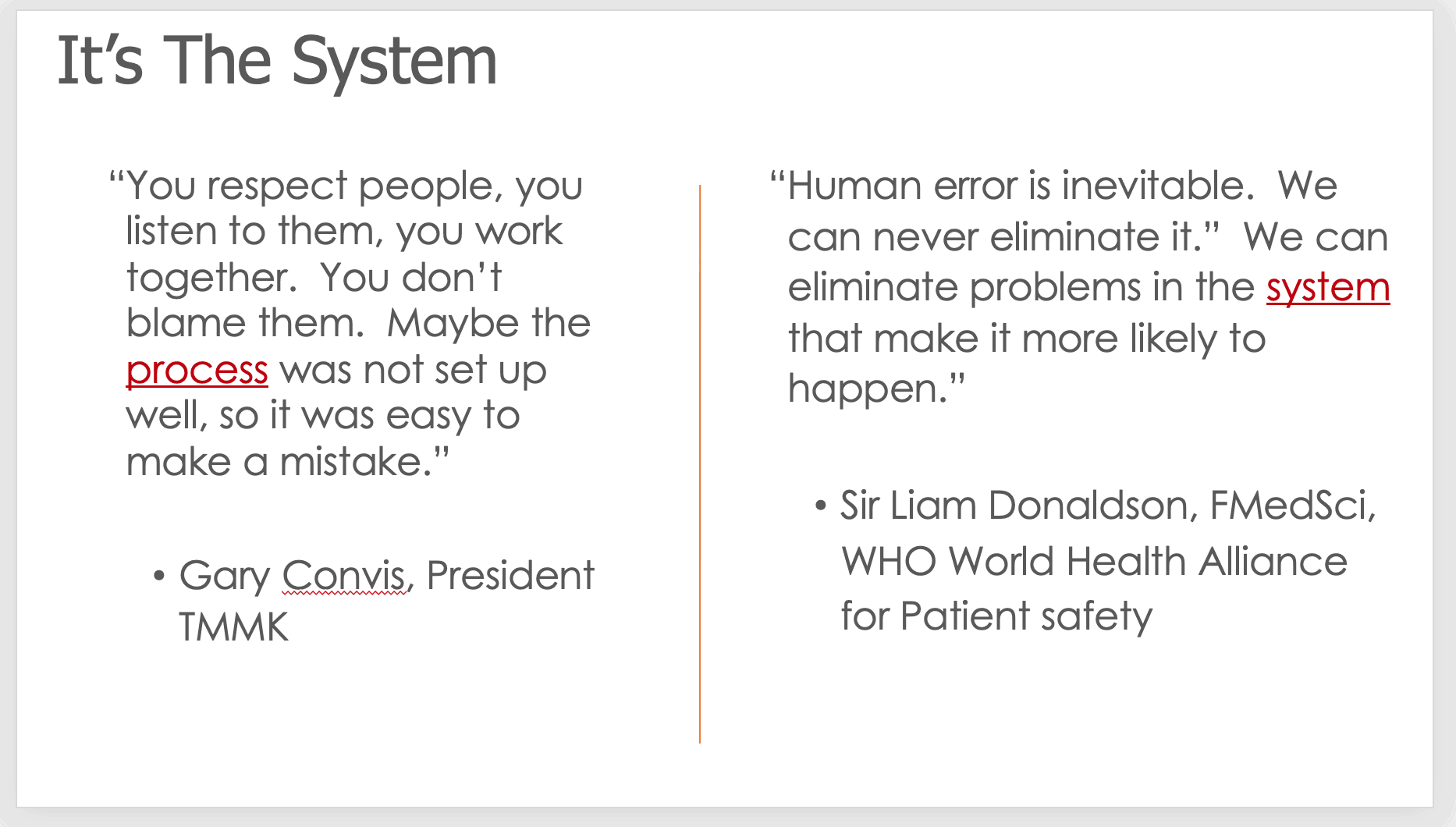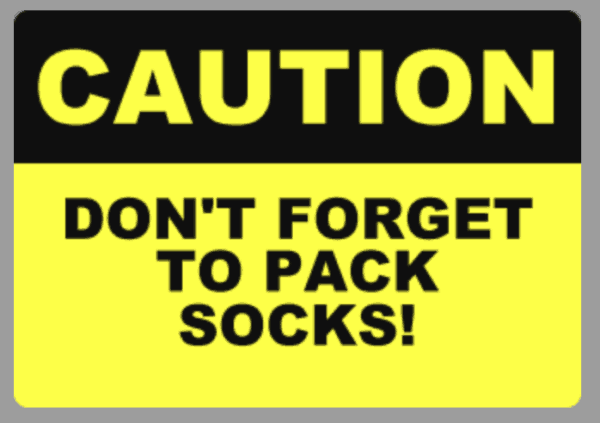Last week, I had the chance to teach and facilitate a Lean education session for a group of health system executives and physician leaders in California.
I really enjoyed that and it was cause for great optimism because their relatively new CEO has a very established Lean track record at previous systems and I've known her for a while.
Packing and unpacking — if not living out of — suitcases is something I spend a lot of time doing. I have a pretty good routine for trips ranging from one to four nights away. But, I don't formally use a checklist. Maybe I should…
This trip was just an overnight trip. I traveled wearing a pair of dress shoes with socks. I'm trying to be more disciplined about working out while on the road and, being an overnight trip, I had plenty of room to pack some casual/athletic shoes and socks for that. And, I did hit the gym the afternoon I arrived.
The next morning, I went to get dressed and realized, to my dismay, I had forgotten to pack another pair of dress socks.
Human error.
I can't remember the last time I've forgotten socks.
I've made other packing errors occasionally — forgetting toothpaste or deodorant, but most any hotel front desk can replace those items.
I don't think the front desk had socks. Maybe I should have asked, but I didn't.
Now, I had worn my dress socks a good part of the previous day, including putting them back on to go to dinner.
I had a choice…
- Put that pair of socks back on, which might have felt sort of gross for a second day
- Wear my casual shoes, with white workout socks… or the
Allbirds “Wool Runners” are really comfortable without socks

So, I had a choice… look more appropriate with a dark grey suit (in the dress shoes) or be more comfortable with the pseudo trainers. At least the
I guess I had other choices, but I wasn't going to wear my previously-sweaty white workout socks with the dress shoes…
I decided to make a bit of a self-effacing teaching moment out of it as I started the session.
After being introduced by the CEO, I admitted to my human error to the group and explained my choice of comfort over looks. I mean, this was a group wearing zero neckties and a few pairs of shorts amongst them. I wasn't the only one not wearing socks.
But, I made the point to them about how human error is inevitable. We are all human. The Toyota idea of “respect for people” means that we need to respect our human nature… and our human fallibility. We get tired, distracted, or sometimes just have a day where we aren't on our game.
I made mistakes all the time. It's usually not the same mistakes over and over again… this time it was forgetting my socks.
So who else?
Since, everybody in the group had traveled a bit and were staying overnight at the hotel for a few days, I asked the group of about 100 people:
“Who else forgot to pack socks?”
Two or three hands went up. That's either the number of people who made that same mistake… or the number who would admit it. I was a bit surprised… but not really.
I then asked:
“Who in the room forgot something you wish you had packed or had meant to pack?”
What really surprised me was that about half of the hands in the room went up… in a room of mostly physicians.
We. Are. All. Human.
We all make mistakes. Human error is going to occur… so instead of throwing up our hands and saying, “What can we do?” we need to have systems in place that either prevent errors… or we mitigate the errors so they don't turn into harm.
What countermeasures could I put in place?
I could try to “just be careful” and odds are I won't make that same mistake. I'll pay so much attention to socks that I might forget something else.
I could put a “packing checklist” in my bag… but every trip is unique (to some extent). I could use a packing checklist that has some room for variation in it depending on the length and type of trip that it is.
Or, maybe I can just tuck an extra pair of socks (and underwear) into a compartment so I have “extra” in case I don't pack enough.
What would you do?
Toyota and Respect
I usually show this slide when talking about the parallels between Lean thinking and the patient safety movement:

Combining the thoughts a bit — again, human error is inevitable. Instead of blaming individuals, we can look at the process. We can learn from errors (or near misses or unsafe conditions) and we can then prevent future occurrences.
That's one of the themes from the patient safety experts in the recent film “To Err is Human.”
It's also a theme in this video where a nurse leader from Virginia Mason Medical Center talks about their “patient safety alert system” — an idea directly inspired by Toyota.
Instead of telling people to be careful, we need better systems. At least my packing error only led to a bit of embarrassment or the risk of stinky or uncomfortable feet. Healthcare errors are far more serious.
Thankfully, the room laughed when I made the tongue-in-cheek suggestion that operating rooms put up big signs that say something like:

They know that's not a good idea. Warning signs aren't a good root cause solution, as I explore in my site BeMoreCareful.com. It probably wouldn't help any more than this suitcase sign that I would probably tune out after a while:

What do you think, related to errors with suitcases or in healthcare?
What do you think? Please scroll down (or click) to post a comment. Or please share the post with your thoughts on LinkedIn – and follow me or connect with me there.
Did you like this post? Make sure you don't miss a post or podcast — Subscribe to get notified about posts via email daily or weekly.
Check out my latest book, The Mistakes That Make Us: Cultivating a Culture of Learning and Innovation:










Mark, this is great. We’ve all forgotten something at some point. Normally, our daily errors don’t have catastrophic consequences. But sometimes they do, as we have all become painfully aware in Canada in the aftermath of the Humboldt bus crash (https://www.theglobeandmail.com/canada/article-truck-driver-in-humboldt-broncos-bus-crash-apologizes-during-closing/).
The challenge lies in the countermeasures, doesn’t it? Is there an ideal system for packing? I doubt. It’s going to rain, snow, sleet, and yesterday the temp (in Celcius) went from +6 to -17. I barely know how to get dressed for a single day, let along pack for a trip to Toronto. But I do know the little things I most often forget, so I always leave toothpaste and a toothbrush in both my briefcase and in a side pocket of my suitcase. That’s my packing countermeasure for now.
For healthcare (and for law), we can easily create systems that make it harder to make those routine mistakes. It’s harder to create systems for the many permutations and combinations that professionals face. But you’re right. We need to try. And we need to stop blaming the individuals who make the mistakes and concentrate harder on addressing why those errors happened.
Hi Mark, this post brought a smile to my face.
I think having a small “inventory” of the most pivotal items like socks and underwear in the suitcase is a good countermeasure, especially if you travel often. I don’t know if socks and underwear “go bad” or get dusty if they stay unused for too long—if so, you might want to create a simply visual reminder to replace them every 6 months, perhaps a card attached inside the bag with “Jan” on one side and “June” on the other.
One the other hand, if you’re flying on Southwest Airlines and people model their behaviors after you, it could tip the balance on the weight of the planes and cause unintended consequences. https://www.wsj.com/articles/faa-probes-southwest-airlines-over-baggage-weight-discrepancies-11550501428
Thanks, Amiel. I guess all I can do is test the countermeasure and see. I could put the backup pairs in a plastic bag. I don’t know if being in a suitcase is any worse than being in a dresser drawer not being worn. I will try this. I have an outer pocket on the bag that could hold this “inventory.”
This is an excellent piece, Mark!. As a journalist, I often write based also on my actual experience and relate it with management buzzwords and theories and top it with a catchy title. Anyway, the best mental checklist to avoid forgetting some basic things during a trip is to check what would you need (or required) from head to toe. For the head, this includes hair gel down to the toe…of course, extra socks, at least add one pair of dress sock X the number of days or nights on travel.